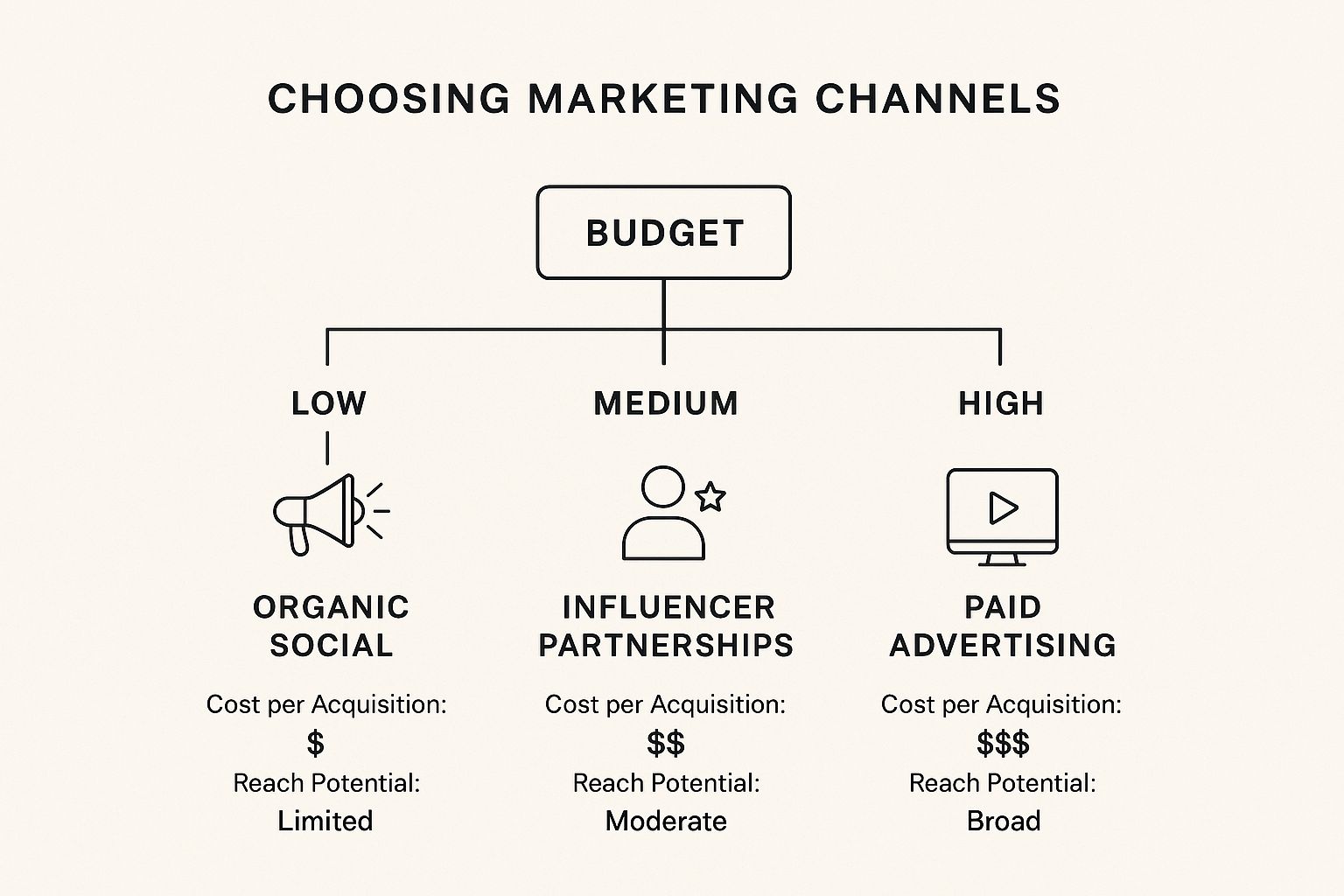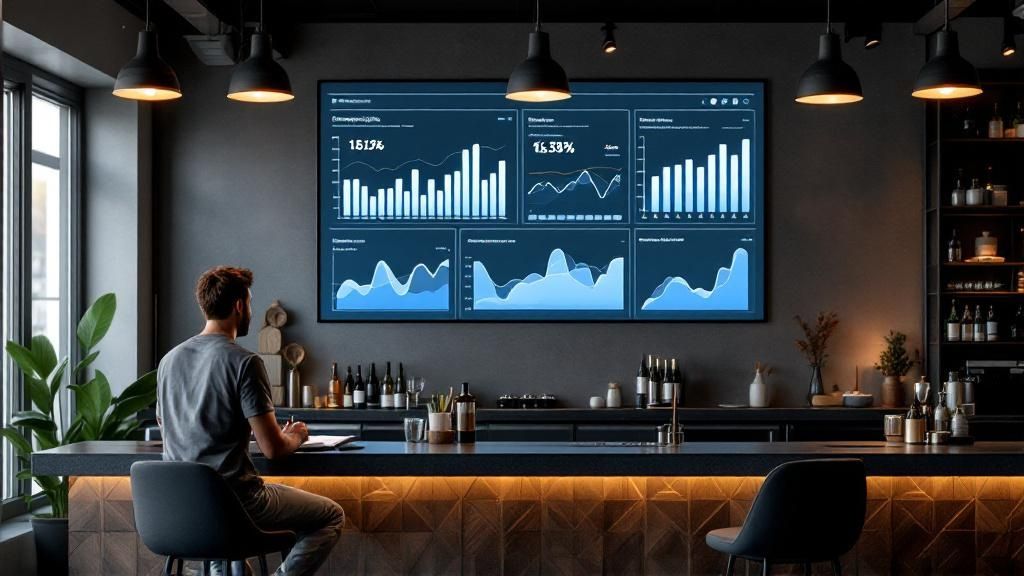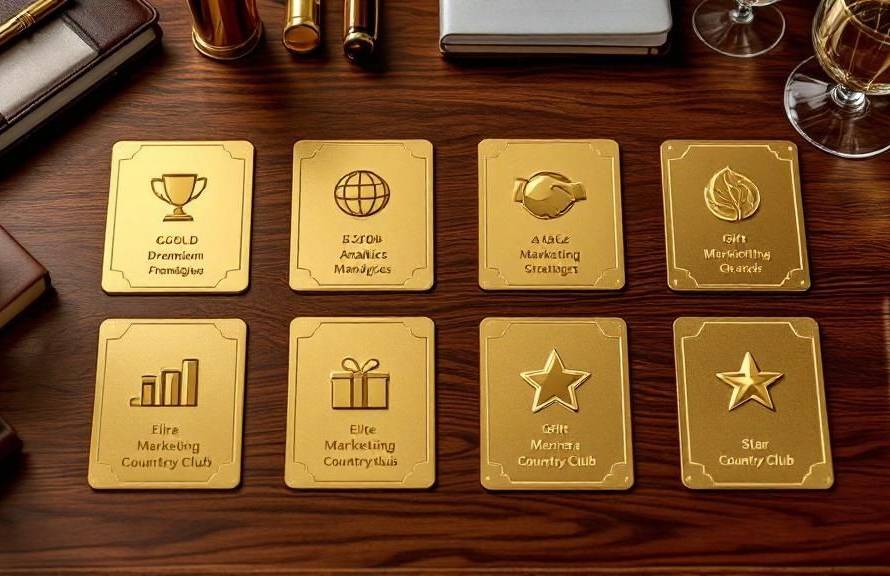A top-tier marketing firm for high-end clubs doesn't just run ads. Their real job is to build an aura of exclusivity and desire around your brand. It’s a completely different game—one that’s less about reaching the masses and more about attracting and keeping a very select group of high-value members. The strategies are sophisticated, discreet, and intensely personal, because in this market, brand prestige is everything.
The New Rules of Luxury Club Marketing

Before you even think about hiring a marketing partner, you have to accept that the entire landscape for luxury has changed. High-end clubs aren't just selling access to a golf course or a dining room anymore. You're selling a lifestyle. You're curating a community. A one-size-fits-all agency just can't keep up.
Today's affluent member expects a lot more than just a beautiful venue. They want seamless digital experiences, communication that feels like it was written just for them, and a real sense of belonging to something special. A generalist agency might just blast your social media with pretty pictures. But a specialized marketing firm for high-end clubs knows the delicate dance between maintaining prestige, respecting privacy, and building a compelling digital presence.
The Power of Exclusivity in a Concentrated Market
Recent market data reveals a fascinating shift. Between 2022 and 2024, the total number of global luxury customers actually dropped by about 50 million. But here’s the kicker: the most dedicated, top-tier clients—making up just over 2% of the customer base—skyrocketed their share of luxury spending from 35% in 2021 to a staggering 45% in 2024.
This insight, highlighted in a report from Bain & Company, proves one thing: marketing must be laser-focused on this elite group. The spending power is concentrated at the very top.
This means your marketing can't afford to be broad. It has to be precise. Elegant. Targeted.
The goal is not to be seen by everyone, but to be coveted by the right people. Your marketing should feel less like an advertisement and more like a private invitation.
Why Specialist Firms Outperform Generalists
When you put a general agency and a specialist side-by-side in the luxury club sector, the difference is night and day. Generalists often recycle tactics that work for mass-market products, which can accidentally water down the very exclusivity you've worked so hard to build.
Specialists, on the other hand, play by a completely different set of rules.
Here's a quick look at how their approaches differ on a practical level.
Generalist vs Specialist Marketing Approaches
| Marketing Task | General Agency Approach | Specialized Firm Approach |
|---|---|---|
| Social Media | Posts generic luxury lifestyle photos and event announcements. Focuses on follower count. | Creates a curated, "behind-the-velvet-rope" content experience that reflects the club's unique culture and respects member privacy. |
| Email Campaigns | Sends broad newsletters with a list of upcoming events to the entire member database. | Segments audiences to send highly personalized messages, such as a note about a new vintage for wine connoisseurs. |
| Member Acquisition | Runs broad digital ads targeting high-income zip codes, often with generic calls to action. | Develops discreet, referral-driven campaigns and uses sophisticated data to identify and reach ideal prospective members through their trusted networks. |
| Website Experience | Builds a standard, visually appealing website that functions like a digital brochure. | Designs an immersive digital experience that tells the club's story, offers members-only access, and captures the feeling of being on the property. |
As you can see, the specialist's approach is all about nuance and depth.
They get it. They understand things like:
- The Nuances of Affluent Audiences: They know where high-net-worth individuals spend their time (both online and off) and how to engage them without being intrusive or, worse, desperate.
- The Importance of Brand Storytelling: They don't just list your amenities. They weave a compelling narrative around your club's legacy, quality, and unique experiences.
- The Role of Discretion: Their strategies are built to protect member privacy while still creating a powerful digital footprint that attracts the right kind of attention.
Ultimately, picking the right marketing firm for high-end clubs comes down to finding a partner who speaks the language of luxury as fluently as you do. They're not just a vendor; they're a guardian of your brand's prestige, ensuring every single campaign reinforces the exclusive value you promise.
Defining What Your Club Truly Needs

Before you even think about picking up the phone to call a marketing agency, the most critical work has to happen within your own walls. I’ve seen it time and time again: a club goes to market with a vague goal like "get more members" and ends up with the wrong firm and wasted money.
Every exclusive club has its own distinct DNA. The right marketing firm for high-end clubs can only work its magic if they know precisely what you're trying to accomplish.
Are you struggling to keep your current members engaged? Trying to attract a younger demographic without ruffling the feathers of your established base? Or maybe you're launching a new tier of bespoke services that needs a sophisticated, quiet rollout. Getting crystal clear on these points isn't just a suggestion—it's non-negotiable.
This internal deep-dive changes the entire game. You’re no longer on a fuzzy hunt for "better marketing." Instead, you’re on a precise mission to find a specialist who can solve a very specific business problem.
Moving Beyond Vanity Metrics
First thing's first: let's get specific about your goals and how you'll measure success. It’s so easy to get mesmerized by flashy numbers—things like social media followers or website clicks. For a high-end club, these are almost always vanity metrics. They look good on a report but don’t translate to real growth.
You need to anchor your strategy to Key Performance Indicators (KPIs) that genuinely impact your bottom line and your brand's prestige.
- Lead Quality Over Quantity: Forget about counting every inquiry that comes in. Instead, track the percentage of leads that are pre-qualified, perfectly match your ideal member profile, and actually convert to a tour or an application.
- Member Lifetime Value (MLV): This is your north star. A truly effective marketing strategy doesn't just bring in new faces; it deepens the relationship, increasing how much members spend and how long they stay with you.
- Brand Sentiment and Prestige: You have to monitor how your club is perceived, both online and within the affluent circles you operate in. You can get a pulse on this through media mentions, social listening, and, most importantly, direct feedback from your highest-value members.
Defining these KPIs gives you a concrete scorecard. When a potential firm presents a case study, you can cut right through the fluff and ask, "That's impressive, but how did your work actually impact the client's Member Lifetime Value?" That’s a question that separates the real experts from the rest.
Auditing Your Current Challenges
With your core KPIs set, it's time for an honest look in the mirror. Think of it as a diagnostic check-up for your club's health. You have to pinpoint the specific pain points you'll be asking a marketing firm to solve.
Take member retention, for instance. We all know the research—it costs 5 to 7 times more to acquire a new member than to keep an existing one. If your data shows a significant number of members leaving after their first year, then retention has to be a top priority in your agency brief.
Your internal audit is your most powerful negotiating tool. When you can clearly articulate, "We need to increase member retention by 15% and attract 20 new members under 40 this year," you force agencies to present specific, relevant strategies instead of generic pitches.
This level of upfront preparation is what ensures you find a marketing firm for high-end clubs that doesn't just look good on paper. It helps you find a true partner with the precise expertise to solve your unique challenges and drive meaningful, long-term growth for your brand.
How to Properly Vet Potential Agency Partners
Okay, you've figured out what your club needs. Now for the hard part—finding the right partner to make it happen. Choosing a marketing firm for a high-end club isn't like picking any other vendor. This is about entrusting someone with the prestige of your brand, and it goes way beyond a slick website or a polished sales pitch.
The vetting process has to be thorough. You're looking for tangible proof, not just promises. A genuinely specialized agency will have a proven track record in the luxury space. They get the discretion and sophistication required to connect with an affluent audience because they've done it before.
Scrutinize Their Portfolio and Case Studies
The first place to look is their past work. It's the most telling evidence you'll find. But don't just get wowed by pretty designs. You need to dig deeper for relevance and, most importantly, results. An agency that has already successfully marketed a high-end resort, a luxury real estate development, or another private club is speaking your language from day one.
When you're looking at their case studies, get specific. Ask questions that cut through the marketing fluff:
- What was the real business challenge? See if they've tackled problems similar to yours, whether it's attracting a younger demographic or boosting member engagement.
- How did you actually define success? A top-tier firm will talk about increasing Member Lifetime Value (MLV) or bringing in more qualified membership applications—not just vanity metrics like website traffic.
- What was the timeline for getting those results? This is crucial for setting realistic expectations for your own club.
A great case study tells a story of transformation. It should clearly lay out the problem, the specific strategy they used, and the measurable business impact it had. If they can’t show you that, it’s a huge red flag.
Let's face it, the luxury hospitality market is exploding. It's projected to grow from $154.32 billion in 2024 to over $218 billion by 2029. This boom is driven by people wanting exclusive, personalized experiences. Your potential agency needs to prove they know how to tap into that. You can discover more insights about luxury hospitality trends to get a feel for the landscape.
Here’s a look at how a firm might map out their channel strategy based on budget—a key decision you'll face together.

As you can see, a smaller budget might lean heavily on organic social media to build the brand. But larger investments open the door to high-reach paid advertising and targeted influencer partnerships, each with its own cost for acquiring a new member.
Assess Their Cultural and Strategic Fit
Beyond their past work, you need to feel out the agency's team and their entire approach. Do they get your club's culture? Luxury marketing is all about nuance and discretion, and if their team doesn't understand that, you're in for a rough ride.
Gauge their strategic thinking during your conversations. A generalist agency might pitch a loud, broad campaign that feels completely off-brand. A true marketing firm for high-end clubs, on the other hand, will come to the table with a more subtle, highly targeted plan.
Don't be afraid to ask them directly:
- How do you market to high-net-worth individuals without being intrusive or tacky?
- What's your process for really getting to know a new client's brand and culture?
- How do you stay on top of trends specifically within the private club and exclusive hospitality world?
Their answers will tell you everything. You'll quickly see if they're just another marketing agency or a genuine strategic partner who can protect and elevate your club's exclusive reputation. When you find the right one, it will feel less like hiring a contractor and more like adding an expert to your executive team.
Why Data and Personalization Are Non-Negotiable
In the world of high-end clubs, generic marketing isn't just ineffective—it's an insult. A mass email blast or a one-size-fits-all offer doesn't just get ignored; it actively damages the very sense of exclusivity you’ve painstakingly built.
The best marketing firms for high-end clubs today act less like traditional advertisers and more like a personal concierge. They use data to anticipate needs and craft experiences that feel bespoke.
This goes way beyond just plugging a member's name into a database. It's about knowing their passions, their preferences, and their patterns. A top-tier firm has the tools—like an advanced Customer Relationship Management (CRM) system—to understand member behavior on a granular level. They know who shows up for every wine-tasting event, who tees off at dawn, and which families make a beeline for the spa.
This kind of insight turns your marketing from a generic broadcast into a genuine conversation.
The Power of Hyper-Personalization
Stop and think about the difference. Instead of sending out a generic club newsletter, imagine sending a private invitation for a new vintage tasting only to members who have consistently attended past wine events.
Or picture this: a member has been hitting the driving range more often, according to your app data. A few days later, a personalized offer for a private lesson with the club pro lands in their inbox.
This is what makes members feel truly seen and valued, tightening their bond with the club. It's not just a hunch; the numbers back it up. A staggering 80% of consumers are more likely to do business with a company that offers personalized experiences. On the flip side, 75% get frustrated by irrelevant content, which is a critical piece of feedback in the luxury space.
A firm that truly gets data can deliver the kind of custom-tailored communication that builds loyalty. You can discover more insights about membership marketing strategies that make this a priority.
A great agency doesn't just collect data; they translate it into meaningful touchpoints. The ultimate goal is to make every interaction feel so personal and timely that the member believes it was crafted just for them.
Evaluating a Firm’s Tech Stack
When you’re vetting a potential agency, you have to get under the hood and look at their technology. Their "tech stack" is the engine that drives all this personalization. Without the right tools, any promises of a data-driven strategy are just talk.
Here's a quick checklist to help you gauge whether a potential marketing partner has the right tools for the job. You're not just looking for brand names; you're looking for proof that they can turn raw data into sophisticated, high-touch marketing.
Essential Tech Capabilities Checklist
| Technology or Capability | What to Look For | Potential Red Flags |
|---|---|---|
| CRM & Member Database | Deep integration capabilities. Can it pull data from your booking system, app, and POS? Look for platforms like HubSpot or Salesforce, or a proprietary system they can demonstrate. | They use spreadsheets or a basic contact list. This shows a lack of sophistication and an inability to track behavior over time. |
| Marketing Automation | The ability to create complex, multi-step "if-then" workflows. For example: "If member books a tee time, then send a post-round dining offer." | They only talk about sending email blasts. This is a sign of a very basic, one-dimensional approach to communication. |
| Behavioral Analytics | They can show you heatmaps, user-flow diagrams, and reports on how members interact with your website and app. They should be using tools like Google Analytics 4 or Mixpanel. | Vague answers about "tracking website visits." If they can't show you how they analyze user journeys, they can't personalize them. |
| Personalization Engine | A system that can dynamically change content on your website or in an email based on a member's known interests (e.g., showing golf content to golfers). | They say they "personalize" by just using a member's first name in an email. This is the bare minimum, not true personalization. |
| Reporting Dashboard | A clear, real-time dashboard that connects marketing actions to results. You should see how a specific campaign impacted member engagement or revenue. | They provide monthly PDF reports with vanity metrics like "email opens." You need to see data that connects to your business goals. |
A truly capable marketing firm for high-end clubs won’t just list their tools; they’ll walk you through their process. They should be able to show you exactly how they turn raw data into the kind of refined, high-impact marketing that makes your club feel less like a business and more like a second home.
Launching a Successful Partnership

You’ve done the hard work of vetting the contenders, digging through their case studies, and finally picking the right marketing partner. It’s a huge milestone, but the real work is just getting started.
What happens next is probably the most important phase for setting up a successful long-term relationship. A handshake is one thing, but how you transition from prospect to partner sets the tone for everything that follows.
Nail Down the Details Before You Sign
It’s time to pour over those final proposals and contracts. Don't just skim the high-level promises; get into the fine print. Any professional marketing firm for high-end clubs will give you a document that’s crystal clear, leaving zero room for interpretation.
You need to walk away with total alignment on three key areas:
- Clear Deliverables: What are they actually doing for you each month? Is it a set number of social media campaigns? A new member event concept each quarter? A specific lead generation effort? Get it in writing.
- Transparent Pricing: The cost structure needs to be simple. Is it a flat retainer, a fee based on performance, or some kind of hybrid model? Vague scope definitions or the potential for hidden fees are massive red flags.
- Mutual Success Metrics: Go back to those KPIs you defined earlier. The contract must spell out the exact goals you're both aiming for, like increasing qualified membership applications by 15% or boosting member engagement scores.
Kicking Things Off the Right Way
Once the ink is dry, the real partnership begins with onboarding. This is where a great firm truly shines. They won't just jump in and start executing tactics; they’ll take the time to immerse themselves in your club’s unique culture.
This initial deep-dive is non-negotiable. Expect your new partners to schedule some serious discovery sessions. They should be insistent on interviewing key people—everyone from the general manager and membership director to influential, long-standing members. That firsthand insight is gold because it provides the nuance that raw data can never capture. It’s how they learn the unwritten rules and traditions that make your club what it is.
An effective kickoff isn't just another meeting; it's a strategic alignment session. This is where you establish a rhythm for communication, lock in reporting schedules, and build the foundation for a collaborative, results-driven partnership from day one.
A well-planned onboarding process ensures the agency works with you, not just for you. It bridges the gap between their outside expertise and your team's insider knowledge, creating a powerful synergy.
Investing this time upfront pays off massively. It prevents misunderstandings down the road and gets you moving toward your shared goals that much faster. By setting clear expectations and opening the lines of communication from the very beginning, you’re creating a partnership that can genuinely elevate your club’s prestige and drive real growth for years to come.
A Few Final Questions About Club Marketing Agencies
Even after you've done your homework, some questions are bound to pop up. Handing over the keys to your club's brand is a big deal, and it's smart to clear up any final doubts before you sign on the dotted line. Most of the time, the lingering concerns I hear from club managers circle back to the same things: budgets, timelines, and exactly what the agency should be doing.
Getting these last few things ironed out is crucial. It’s the final check to make sure you’ve found a real partner, not just another vendor.
What’s a Realistic Marketing Budget for a High-End Club?
While every situation is different, a good starting point for clubs in the luxury space is to set aside 7-12% of your total revenue for marketing. But let's be clear: this isn't a hard-and-fast rule. The right number for you is completely tied to what you're trying to achieve.
For example, a club trying to bring in a younger crowd will probably need to front-load their investment into slick digital campaigns and memorable events. On the other hand, if your main goal is keeping the members you already have happy, that money might be better spent on personalized communication and exclusive perks.
A sharp marketing firm for high-end clubs will dig into what your competitors are doing to help you find a number that actually makes sense for your goals. The conversation should always be about the return, not just the spend. In this business, great marketing attracts high-value members who stick around for the long haul, making that initial investment pay for itself many times over.
The most important conversation isn't about the total spend, but about how that spend connects directly to measurable business goals. A smaller, well-aimed budget is always more effective than a large, unfocused one.
How Quickly Can We Expect to See Results?
This is a game of patience, but you should absolutely see signs of life early on. Within the first 30 to 60 days, you ought to notice some positive momentum. I'm talking about things like more of the right people visiting your website, better engagement on your social channels, and an uptick in inquiries from your ideal member profile. These are the green shoots that tell you the strategy is working.
But the results that really move the needle—a real jump in qualified membership applications and a boost in member spend—take a bit more time to cultivate. For a comprehensive strategy to truly hit its stride, you're typically looking at six to nine months.
Any agency worth its salt will set clear 30, 60, and 90-day milestones from the get-go. They should give you a transparent roadmap so you can see exactly how they're tracking toward your most important goals.
Should the Agency Manage Our Social Media?
Yes, but with a huge caveat: their approach has to be completely different from standard social media management. For a high-end club, social media isn't about chasing viral fads or racking up empty follower counts. It’s about creating an air of exclusivity and aspiration.
A firm that gets it will use platforms like Instagram and LinkedIn to tell a sophisticated story. The real goal is to provide a tasteful, "behind-the-velvet-rope" peek into the club's world—highlighting exclusive events and the unique vibe without ever making members feel exposed.
Their strategy should be built on three core ideas:
- Refined Content: Stunning visuals and compelling storytelling that scream prestige.
- Targeted Advertising: Using data to discreetly get in front of high-net-worth individuals.
- Subtle Engagement: Building a sense of community without being pushy or overtly commercial.
When it's done right, your social media presence should feel like a digital extension of the clubhouse itself: elegant, curated, and just a little bit out of reach.
Ready to attract more of the right members to your club? Country Club Lead Systems provides a proven, plug-and-play ad service designed specifically for golf and country clubs. Our strategies are built to generate high-quality leads and deliver exceptional ROI. Learn more and see how our system can work for you.



